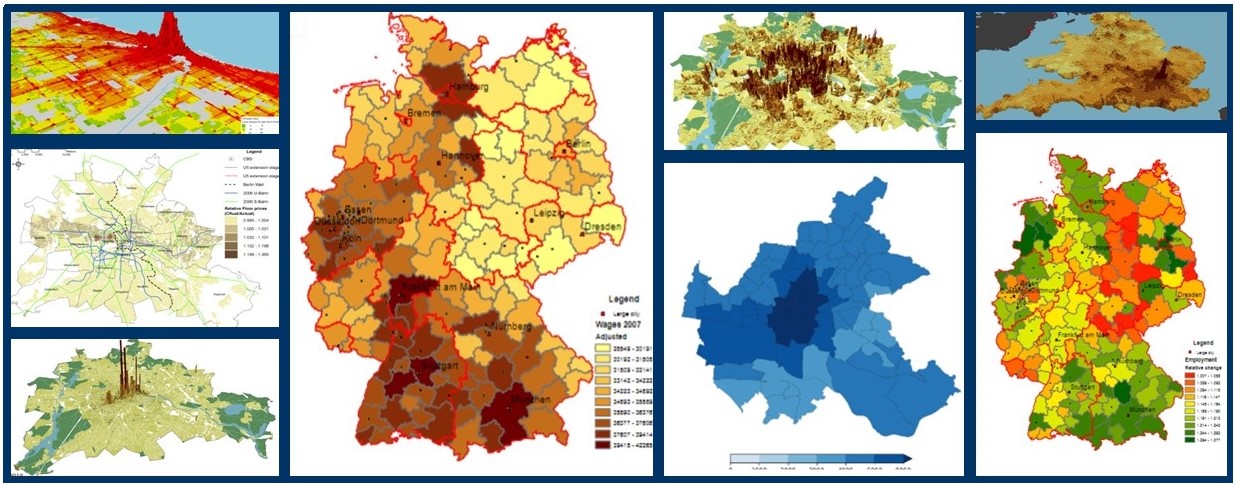Prof. Dr. Gabriel M. Ahlfeldt (chair holder)
Gabriel Ahlfeldt holds the Chair of Econometrics at the Humboldt Universtity School of Business and Economics. He is a quantitative spatial economist who joined Humboldt University in March 2024. Previously, he was Professor of Urban Economics and Land Development and the director of the MSc Real Estate Economics and Finance at the London School of Economics. He is editor of Regional Science and Urban Economics, a visiting professor at the London School of Economics, affiliate of the CEPR and CESifo research networks, and a co-organizer of the Berlin School of Economics Quantitative Spatial Economics Research Seminar. For more information, visit www.ahlfeldt.com and www.bqse.de.

About the Chair of Econometrics
|
The Chair of Econometrics consists of a mix of tenured faculty, junior researchers, and student researchers who specialize in the analysis of economic data using quantitative methods. The Chair is led by Prof. Dr. Gabriel Ahlfeldt, who takes the lead in applied teaching, research, and policy work. Dr. Gábor Uhrin holds a tenured position at the Chair and leads its activities in the area of econometric methods. Please visit the staff website for a full list of current and past members. For the interested reader, we also offer a brief history of the chair. |
Research
|
We are a research-oriented chair, aiming to make a significant contribution to academic literature at an internationally competitive level. Current and past members of the chair have published in economics general interest journals, top field journals, and a broad range of interdisciplinary journals. We aim at research with impact and regularly engage with research questions that are central to the policy debate. Our research is regularly covered by national and international media. |
Teaching
|
One of our central goals is to deliver excellent training in econometric methods and their applications. Our teaching is designed to enable students to answer real-world questions using appropriate data and methods. To this end, we offer a portfolio of courses in econometric methods and applied econometrics at the Bachelor's, Master's, and PhD levels. Please check the Teaching page for a detailed description of the courses we offer. |
Quantitative Spatial Economics
|
One area of specialization of the chair in research and teaching lies in Quantitative Spatial Economics (QSE). QSE combines theoretical, empirical, and computational methods to model the economy as a set of locations linked via commuting, migration, and trade. It models the spatial economy in general equilibrium, accounting for interdependencies in land, labor, and goods markets. Quantitative spatial models have become general-purpose tools for simulating the effects of a broad range of policies seeking to improve productivity, amenities, transport accessibility, trade integration, environmental quality, and labor market efficiency, to name just a few. We aim to be a central node for the development of the quantitative spatial economics community in the greater Berlin metropolitan area. To this end, we offer the course 'Quantitative Spatial Economics' in the Berlin School of Economics PhD prgram and co-organize the Berlin School of Economics Quantitative Spatial Economics Research Seminar. |
Policy and Practice
|
At the Chair of Econometrics at Humboldt University, we are dedicated not only to advancing the field of econometrics but also to applying our expertise toward the betterment of society. We have expertise in the application of methods of causal inference to ex-post assess the effectiveness of various programs and initiatives. We have a strong interest in promoting the application of quantitative models to inform policy decisions ex-ante, with a special focus on urban and regional policy design. We are open to and have rich experience in collaborations with external parties, including government agencies, non-profit organizations, and private sector entities, who share our vision of making meaningful societal impacts. |
Announcements
+++ Staff news winter term 2024/25: Dr. Gábor is back from paternity leave; Prof. Dr. Gabriel M. Ahlfeldt is on sabbatical at the University of Barcelona; Nicolai Spranger has a teaching assignment for Applied Econometrics +++
+++ As of March 1, 2024, Prof. Dr. Gabriel M. Ahlfeldt has joined Humboldt University as the new Chair of Econometrics. Previously, he has been Professor of Urban Economics and Land Development at the London School of Economics +++
